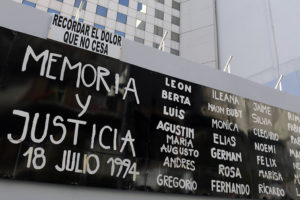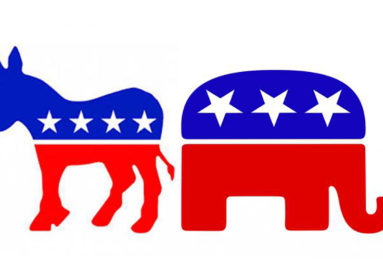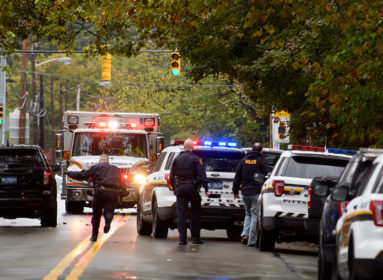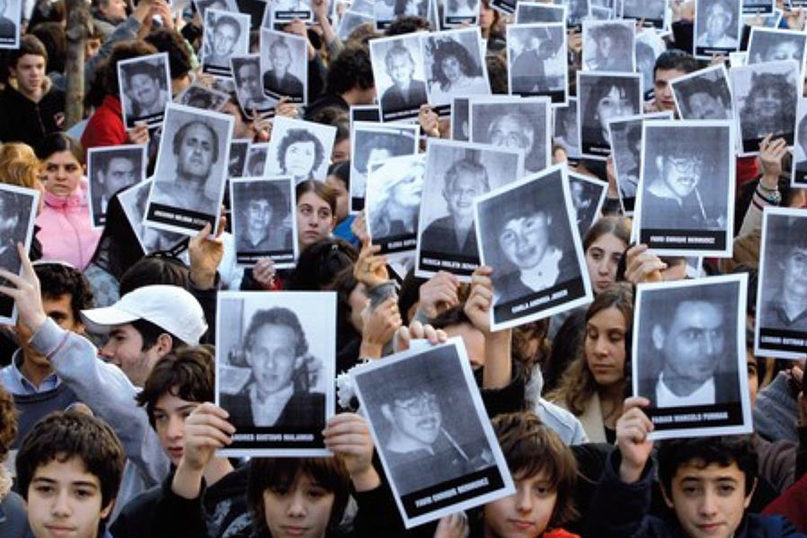
By Ilan Stavans
AMHERST, Mass. (JTA) – Twenty-five years after the terrorist attack that targeted the AMIA Jewish center in Buenos Aires, leaving 85 people dead and hundreds more injured, one thing is clear: The lives of Latin American Jews were changed forever.
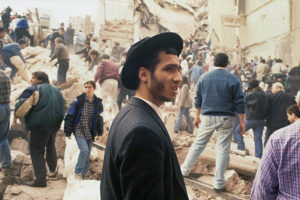
People look on after an explosives-laden truck blew up outside the Argentine Israeli Mutual Association (AMIA) building on July 18 1994, in Buenos Aires, Argentina. Julio Menajovsky/Handout via REUTERS
With nearly 200,000 Jews at the time, from various religious and ethnic backgrounds, Latin America had the third largest Jewish population after Israel and the United States. At 9:53 on the winter morning of July 18, 1994, these relatively quiet, laissez–faire communities – in a region not known for openly acknowledging the existence of any type of dangerous local antisemitism – came face to face with their own vulnerability.
In spite of how far they were from the Middle Eastern conflict, the tragedy placed them firmly within its orbit. It quickly became clear that the terrorists were Iranian operatives with connections to the then-president of Argentina, Carlos Saul Menem, who was of Syrian descent. In March 1992, there had been a terrorist attack at the Israeli Embassy in Buenos Aires. Like the pre-9/11 attack in 1993 against the World Trade Center, it is now seen as a foreshadowing of what was to come.
The immediate reaction in the Hispanic Jewish world to the attack on the Asociación Mutual Israelita Argentina was one of tightening up. Long-lasting security measures were implemented in schools, synagogues, and sports and cultural centers, not only in Argentina but in Mexico, Chile, Colombia, Brazil, Venezuela and other countries. If you were a visitor eager to attend services, for instance, you could no longer simply show up at the door. Proper documentation was now required, often months in advance. Likewise, armed police were stationed outside the premises. Guards accompanied rabbis and other Jewish leaders on the street.
More important, the region’s antisemitism was now seen under a new lens. In particular, there was distrust. After all, Latin America has the largest concentration of Palestinians outside of the Middle East. Like Jews, they are largely a peaceful minority. No doubt there are extremists on both sides.
But the jolt went further. After the AMIA tragedy, it became obvious that Hispanic antisemitism needed to be understood in its own terms. While its roots were linked to the same type of ancestral anti-Jewish hatred in Europe, the United States and the Arab world, the specific forces shaping it in Argentina, Venezuela and elsewhere in the area showcased a unique metabolism, aligning themselves to international antisemitic trends while also responding to local conditions that fostered them.
It had started in the colonial period, when the Spanish Inquisition persecuted lapsed New Christians and others it portrayed as heretics. It had gone on during the anti-immigrant fervor of the early 20th century, reaching a climax in Buenos Aires during the Semana Trágica of 1919, the first and only pogrom ever to take place in the Americas, in which Jews were targeted because they were considered to be communists and anarchists. About 700 people died.
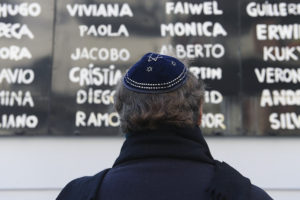
A man prays in front of the AMIA Jewish center during the commemoration of the 23rd anniversary of the AMIA bombing. Credit: AFP/Juan Mabromata / Getty Images
The AMIA attack propelled the career of antisemitic ideologue Norberto Ceresole to new heights. Ceresole, an Argentine who became an adviser and confidant of Venezuelan strongman Hugo Chavez, argued that it was Israel and Argentine Jews who had orchestrated the AMIA explosion in order to create empathy from others, as well as to advance their financial and political influence in Latin America. Ceresole and others were partially responsible for the mutation of antisemitism to anti-Zionism in the Spanish-speaking world, portraying Israel as the world’s satanic representative in the Southern Hemisphere and Latin American Jews as its tool.
Other post-1994 connections include the re-emergence of neo-Nazis in Paraguay, Brazil, Bolivia, Chile and Argentina. One of their theoreticians was Miguel Serrano, a friend of C.G. Jung and the author of The Visit of the Queen of Sheba (1960), who in numerous volumes argued that Adolf Hitler was scheduled to be reborn in Latin America. Serrano’s rhetoric found a following among the children of former Nazis and other Germans who immigrated to South America as part of the so-called “rat route” that enabled Adolf Eichmann, Josef Mengele and other SS officers to escape once World War II concluded. Like Ceresole, Serrano saw the AMIA attack as the advent of a new age in which Latin American Jews were tools to implement Israel’s influence in the Southern Cone.
Indeed, in the aftermath of the Eichmann kidnapping by Mossad agents in Buenos Aires in 1960, underground Jewish self-defense organizations had been active in Argentina, Chile, Venezuela and Mexico, among other places. The AMIA attack brought the need to re-evaluate these strategies. An in-depth examination of the life of Mauricio “Tata” Furmanski, the recently deceased Zionist leader (born in 1928, who saw himself as a modern Maccabi) will allow a fuller, comprehensive understanding of the orchestration of these self-defense entities before and after 1994.
Personally, the attack made me aware of my own role as Jewish-Mexican scholar and public intellectual in the United States.
I realized knowledge about the history of Latin American Jews was frighteningly limited outside of the region. It was time to open people’s eyes to the history of crypto-Jews in the New World, to anti-Zionism in the Americas and to the latent yet dangerous voice of neo-Nazis in the region. By expanding people’s horizons on what makes Latin American Jews tick and under what circumstances they live, their role in today’s zeitgeist would be taken more seriously.
In short, the AMIA attack was a wake-up call.
After 1994, it is clear to Latin American Jews that antisemitism, at times ignored and exaggerated, is a clear and present danger linked simultaneously to the region’s ultra-right and ultra-left factions. The community realized that no matter how peripheral you might consider your country to be, globalism sucks you in. To adequately combat antisemitism, both homegrown advocates and international links must be understood.
Ilan Stavans is Lewis-Sebring Professor of Humanities, Latin America and Latino Culture at Amherst College, publisher of Restless Books, and host of the NPR show In Contrast. His book The Seventh Heaven: Travels through Jewish Latin America (Pittsburgh) will be published in October.
The views and opinions expressed in this article are those of the author and do not necessarily reflect the views of JTA or its parent company, 70 Faces Media.
Latin American Jews still don’t have justice 25 years after the AMIA massacre
By Sharon Nazarian
NEW YORK (JTA) – In any crime against a community, certain things must happen to provide some measure of healing and redemption.
But as we mark the 25th anniversary of the horrific bombing of the AMIA Jewish center in Buenos Aires, Argentina, these necessary steps have not taken place.
Despite years of activity and rhetoric, justice has not been achieved for the victims, their families and Latin American Jewry – 85 people were killed and 300 injured. Argentines have not been brought together in solidarity with the Jewish community, and the government has not instilled a measure of confidence that such a devastating event will be prevented from ever happening again.
Because of this reality, a feeling exists all these years later that the terror is being relived constantly rather than being put behind them.
Early on, it became clear that Iran, through its terrorist proxy Hezbollah, was responsible for the bombing. Hezbollah had been active in the anarchic border among Argentina, Paraguay and Brazil known as the Triple Frontier.
Interpol made clear that it suspected high-level officials in the Iranian regime as being the masterminds of the plot. In 2007, red alerts were issued for former Foreign Minister Ahmad Vahidi and other Iranian officials. Disappointingly, Interpol did not issue similar alerts for former officials such as Ali Rafsanjani, Ali Akbar Velayati and Hadi Soleimanpour, the ex-ambassador to Argentina.
Meanwhile, different Argentine governments and judiciaries mismanaged or politicized the matter and never truly followed up to bring those responsible to justice.
The investigation reached a low during the presidency of Cristina Fernandez de Kirchner between 2007 and 2013. A special prosecutor, Alberto Nisman, was appointed and, according to reports, he allegedly found Kirchner and other members of her government guilty of complicity with the Iranians to cover up the Iranian role in the bombing. The day before Nisman was scheduled to issue his findings, he was found dead in his apartment.
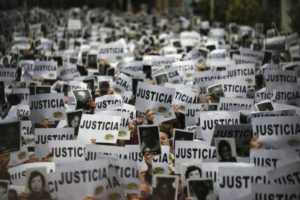 Kirchner’s government quickly claimed it was a suicide, but it soon became apparent that Nisman had been murdered. Nisman has come to be known as the “86th victim” of the AMIA attack. His death was tragic not only because the world lost a committed prosecutor, but also because some of the deepest and more complicated findings of the case were buried with him.
Kirchner’s government quickly claimed it was a suicide, but it soon became apparent that Nisman had been murdered. Nisman has come to be known as the “86th victim” of the AMIA attack. His death was tragic not only because the world lost a committed prosecutor, but also because some of the deepest and more complicated findings of the case were buried with him.
Still, there have been some advances, including some by the current administration of President Mauricio Macri.
In July 2018, Argentine federal judge Rodolfo Canicoba Corral requested the arrest and extradition of Velayati from Russia and China when he was visiting those countries. Velayati, an adviser to Iran’s supreme leader, was implicated in ordering the bombing while he was foreign minister.
That same month, the Argentine Financial Information Unit ordered the freezing of assets of Hezbollah financiers in the Triple Frontier, the place where the attack is believed to have originated.
To help prevent future attacks, the Argentine government last week labeled Hezbollah a terrorist organization. With the support of the U.S. government, Argentina can become a regional leader in the fight against terrorist and criminal activity in Latin America.
In addition to these positive developments in efforts to bring the perpetrators to justice, a silver lining has emerged regarding the attack’s collective impact on Argentine society.
Initially, the AMIA bombing was seen only as an attack on Jews. Non-Jewish victims, of which there were many, were perceived as “innocents.” This approach separated Jews from the rest of the society and also implied that somehow Jewish or Israel activity may have been the cause of the bombing. While it took many years for authorities to take a clear and proper stand on these matters, today there is an effort to make the AMIA bombing a symbol of pain for all Argentines.
It is encouraging to see that the current Argentine government has made a global effort to commemorate the attack in many consulates and embassies around the world. The Anti-Defamation League joined in ceremonies organized by Jewish groups in partnership with the government of Argentina in New York, Chicago, Miami, Washington, D.C., and Los Angeles, and ADL’s Israel Office has partnered with the Diaspora Museum to commemorate the tragic attack with a remembrance ceremony. A government-sponsored traveling photo exhibit was unveiled recently in New York depicting vivid photos of that fateful day juxtaposed with contemporary portraits of the surviving families.
Argentina suffers from some of the same rising antisemitic trends we see globally now, and while there have been many missteps in the investigation, it is apparent that the Macri administration has committed to fighting antisemitism.
On this anniversary, the importance of not forgetting has more meaning potentially if these positive steps will become a permanent part of the Argentine approach to this tragedy. Argentina must continue to step up.
Sharon Nazarian is director of international affairs at the Anti-Defamation League.
AMIA Briefs
US senators introduce resolution to remember AMIA bombing
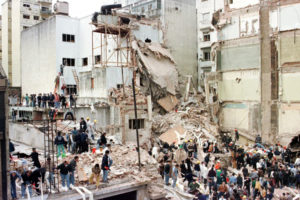 (JTA) – A bipartisan group of U.S. senators introduced a resolution on July 18 to remember the 1994 bombing of the AMIA Jewish community center in Buenos Aires. Sens. Bob Menendez, D-N.J. and Marco Rubio, R-Fla., introduced the resolution on the 25th anniversary of the attack on the AMIA Jewish center. Argentina and Israel have long blamed Iran and implicated several former Iranian officials and Hezbollah in the attack, in addition to the March 17, 1992 attack on the Israeli Embassy in Buenos Aires that killed 29 and injured more than 200.
(JTA) – A bipartisan group of U.S. senators introduced a resolution on July 18 to remember the 1994 bombing of the AMIA Jewish community center in Buenos Aires. Sens. Bob Menendez, D-N.J. and Marco Rubio, R-Fla., introduced the resolution on the 25th anniversary of the attack on the AMIA Jewish center. Argentina and Israel have long blamed Iran and implicated several former Iranian officials and Hezbollah in the attack, in addition to the March 17, 1992 attack on the Israeli Embassy in Buenos Aires that killed 29 and injured more than 200.
Menendez and Rubio were joined by four co-sponsors: Sens. Ben Cardin, D-Md.; Ted Cruz, R-Texas; Tim Kaine, D-Va.; and Todd Young, R-Ind.
“It is critical that the U.S. recommit to helping the Government of Argentina in their investigation,” Menendez said in a statement. “The Argentinian people have waited long enough for answers.” Rubio added that the lawmakers were recommitting “to helping the Government of Argentina seek justice for the victims and their families.”
The Foundation for Defense of Democracies, a Washington think tank that has advocated in the United States for probing the AMIA attack, noted that the resolution points out that the “suspects continue to travel globally with impunity.”
Trump offers $7m for info leading to arrest of bombing suspect
(JTA) – The Trump administration is offering up to $7 million for information leading to the arrest of a Hezbollah operative believed to have helped engineer the AMIA bombing. The reward offer posted July 18 by the State Department identifies Salman Raouf Salman, also known as Samuel Salman El Reda, as a “key leader” of the Lebanese Hezbollah terrorist militia. El Reda is also one of nine suspects in the AMIA bombing still subject to an Interpol red notice, or warrant. The other eight are Iranians.
Argentina and the United States convened a ministerial summit on terrorism last week to mark the AMIA bombing, and both have expressed frustration that the nine suspects are still free to travel, despite the Interpol warrants. Israeli intelligence has identified Al Reda, a dual Colombian-Lebanese citizen, as the on-the-ground coordinator of the attack.
Argentina designates Hezbollah a terror group
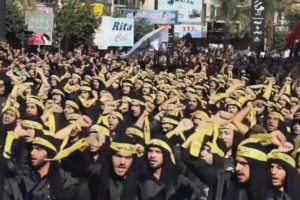 (JNS) Argentina ordered the freezing of Hezbollah assets on July 18, effectively designating it as a terrorist entity, being the first Latin America country to do so. Hezbollah member Ibrahim Hussein Berro was identified as the AMIA bomber, killing the 85 people and injuring hundreds.
(JNS) Argentina ordered the freezing of Hezbollah assets on July 18, effectively designating it as a terrorist entity, being the first Latin America country to do so. Hezbollah member Ibrahim Hussein Berro was identified as the AMIA bomber, killing the 85 people and injuring hundreds.
Additionally, a Politico bombshell in December 2017 exposed the network of money-laundering and other crimes done by Hezbollah, including operations in Latin America, for which the Obama administration let pass in order to reach the 2015 nuclear deal with Iran.
“Argentina took a very important step today,” Emanuele Ottolenghi, senior fellow at the Foundation for Defense of Democracies, told JNS. “By designating Hezbollah [as such], it showed leadership in the fight against terrorism and terror finance. Now others must follow Argentina and show they are ready to tackle this threat. Hezbollah’s presence in Latin America is well-documented, and this is a welcome change in a part of the world where governments, including Argentina’s neighbors, have for too long looked the other way.”








 Southern New England Jewish Ledger
Southern New England Jewish Ledger